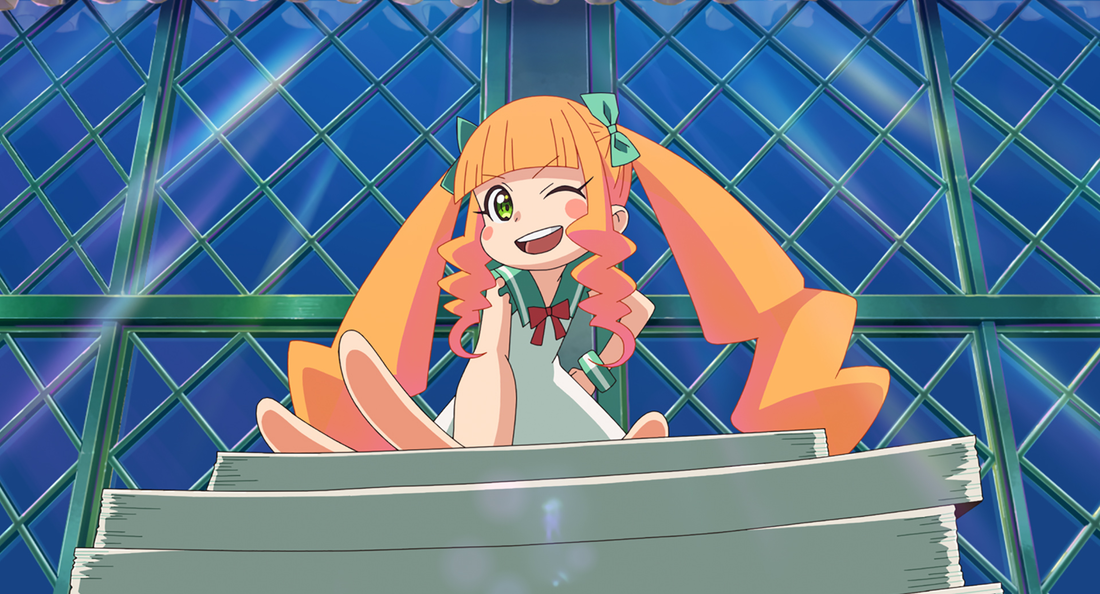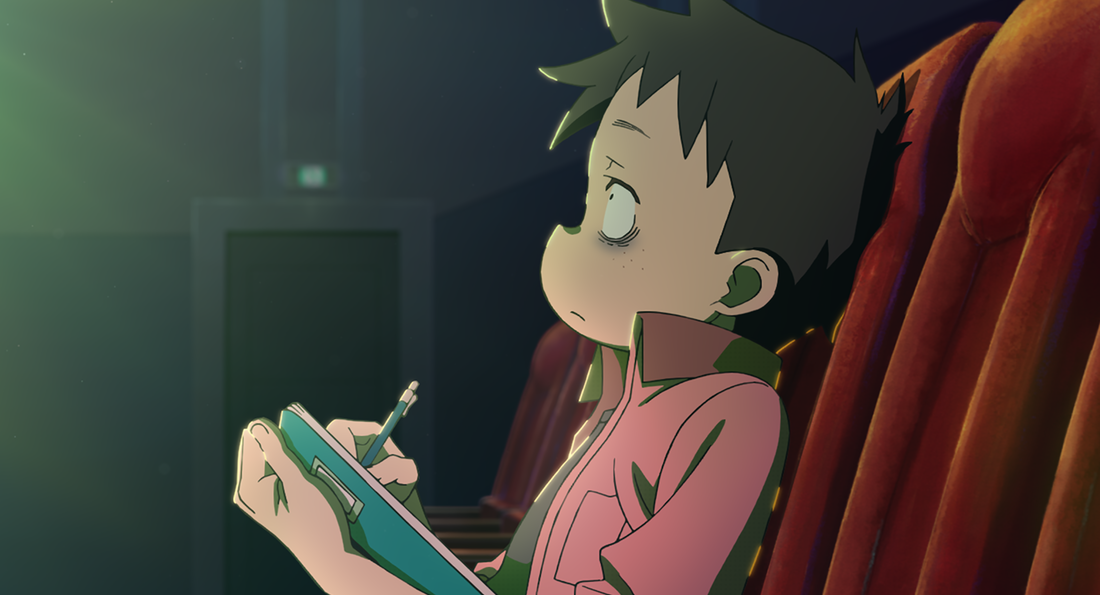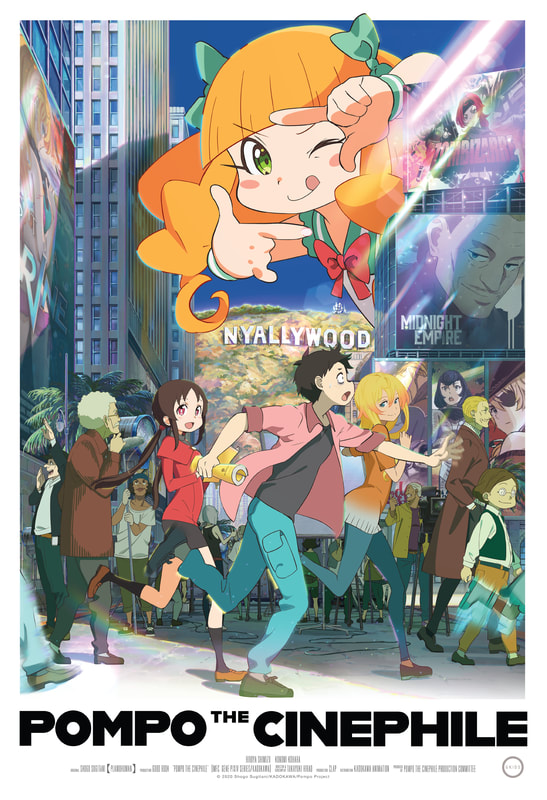|
Making a movie about movie making is a fun way to experiment with self-referentiality and multiple layers of meaning. Plus, any movie about Hollywood and the film industry has magic built right in. There’s no shortage of movies about people who fall in love with the cinema and eventually rise to stardom (which is why La La Land wasn’t as entertaining or significant as it wanted to be), but such stories are still charming and nostalgic. There’s nothing more magical than a movie scene in which one of the characters goes to the cinema and gets lost in the magic of the screen, a familiar scene that’s been used to evoke a sense of wonder and nostalgia in films like Up, Australia, Once Upon a Time… In Hollywood, Cinema Paradiso, and others. The process of falling in love with cinema isn’t one that you can explain with words or even with a still photograph. It’s a process that’s best explained through the medium of film itself — which is why Shogo Sugitani’s manga series Pompo: The Cinephile just had to be made into a film. Director Takayuki Hirao rose to meet this challenge, creating an entertaining anime flick that’s wrapped in layers of self-referentiality. Pompo the Cinephile is named after one of its leading characters, Joel D. Pomponette (aka “Pompo”), a B-movie producer and the granddaughter of a legendary filmmaker. Pompo works in “Nyallywood,” a vibrant and bustling city where dreams come true. Unlike the title suggests, however, Pompo the Cinephile is less about Pompo herself and more about her assistant, Gene, who has dreams of becoming a filmmaker himself. After he reads Pompo’s latest script, “Meister,” he’s shocked to find out that Pompo wants him to direct and edit it. Pompo has also picked a first-time actress, Natalie Woodward, to star in the film alongside “the best actor in the world,” Martin Braddock. With both new and established talent in the mix, there’s a lot that could go wrong. The filmmaking process is challenging and, at times, heartbreaking, but it reminds Gene, Pompo, Natalie, and Martin why they wanted to make movies in the first place. When Gene first reads Pompo’s script, he says that it’s “a hackneyed cliche of a story.” The same could be said about the story of Pompo the Cinephile. It gets particularly corny towards the end, and unfortunately, the characters aren’t that unique either. Gene’s passion for the cinema is endearing, but we’ve seen plenty of troubled, introverted artists just like Gene in other films. Pompo even romanticizes the troubled artist stereotype when she tells Gene that she hired him to be her assistant because all the other applicants were too happy, and “happiness destroys creativity.” The one exception in this cast of stereotypical characters is Pompo herself. As a character, Pompo straddles the line between a spoiled diva on the verge of a tantrum and a genius mastermind who’s secretly working for the good of everyone around her. It’s an odd combination of character traits, and at first, Pompo can give the audience whiplash. But her extreme personality fits the over-the-top, exaggerated world of the film, and she’s a breath of fresh air in a movie full of stereotypical characters. Pompo the Cinephile is about something much deeper than its surface-level characters and rise-to-stardom story. Viewers won’t remember the plot of Pompo the Cinephile as much as they’ll remember how they felt when they watched it. The movie’s style, aesthetics, and self-referentiality create an uplifting tone and a welcoming, friendly viewing experience that outweighs the flaws in the plot. The story and dialogue might be corny, but the versatility of the anime genre allows for stunning stylistic moments that allow viewers to relate to the characters in a genuine way. Pompo the Cinephile capitalizes on the versatility and stylistic conventions of anime to illustrate the joy of filmmaking, thereby bringing joy to the audience. Not only does it celebrate filmmaking, it also takes us on a journey through the filmmaking process from the perspective of an editor. The opening sequence reflects an editor’s point of view as they go through raw footage and get ready to make a movie (specifically, the movie we’re about to watch). There are also a few “rewind sequences” throughout Pompo the Cinephile, which represent the way that an editor might rewind through footage in order to make changes. These self-referential techniques remind us that the movie we’re watching is the result of hours and hours of work put in by talented artists who are probably a lot like Gene. As a result, Pompo the Cinephile offers a different viewing experience than the average movie. The audience isn’t supposed to get lost in the story. Instead, we’re pulled in and out of the story and constantly reminded of our own position as viewers. At various points throughout the story, Pompo the Cinephile transitions from the “reality” of Nyallywood to an imaginative fantasy space that represents Gene’s inner world. In one scene, we see Gene in a theater watching his own life play out on the screen while he takes notes. It’s as if he were sitting right beside us in our own home or movie theater watching Pompo the Cinephile. In scenes where Gene is editing, we see him against a black backdrop as strips of film swirl around him. He moves his hands around as if he’s conducting an orchestra, manipulating bursts of light and color as he puts his film together. These editing montage sequences celebrate the joy of filmmaking by taking Gene out of the editing room and into a lively fantasy space. In live-action movies, transitions between imagination and reality can be jarring and confusing. But in an animated movie, and particularly in anime, these transitions just make sense. As a whole, Pompo the Cinephile effortlessly pulls us through reality, imagination, and metaphor as it draws connections among film, filmmaking, and life. For more information about Pompo the Cinephile, including local screening times, go to the Pompo the Cinephile website.
0 Comments
Leave a Reply. |
"Our embodied spectator, possibly perverse in her fantasies and diverse in her experience, possesses agency...finally, she must now be held accountable for it." Categories
All
|







